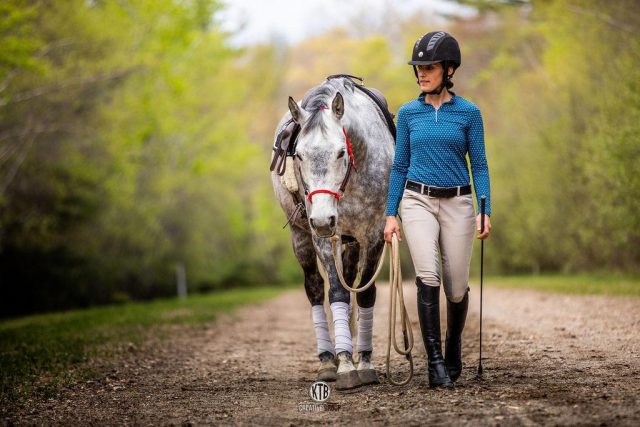
When You Shouldn’t Ride Your Horse
“Whether you’re not in the right headspace to ride, or you don’t have the time that day to allow for a rush-free session, find other ways to solidify your bond with your horse (grooming, groundwork, a simple hand grazing session).”

Photo by KTB Creative
Ever heard the saying, “Just because you can, doesn’t mean you should?”
That applies to lots of things with horses, including choosing to ride. I’m not talking about giving your horse a day off because he walks into the barn lame or missing a shoe. That’s a no-brainer; we should always prioritize our horses’ health and wellbeing over work. I’m talking about when it’s a better training strategy to choose not to ride. It might not be as obvious, but that is also a choice that prioritizes your horses’ health and wellbeing.
I’ve discussed getting into a good mental state before (and while) you ride, but I want to provide a big caveat here: there will be times, over the course of your riding career, that might not be possible. We are humans, and that means that sometimes we’ll be in a state of distraction, stress, anxiety, you name it — where we need to prioritize taking care over ourselves above riding. If you’re an amateur, meaning your livelihood does not depend on riding horses, this is especially true. You probably have a career, a family, and other responsibilities that put limitations on your time and mental bandwidth. Recognizing, accepting, and even embracing these moments is part of being a better rider.
Let me give you an example.
Suzy has a sensitive mare and, through working with her trainer, Suzy and her mare have come so far in their training together. Suzy has learned the careful kind of ride that her mare needs and is contentious of putting only the smallest amount of pressure on her mare to get the desired result in their training. She also recognizes that her mare needs about 15 minutes of groundwork before each ride in order for them to connect and really feel in sync for the ridden work.
Suzy gets to the barn on this particular day, dressed and ready to ride. However, she’s just learned that her friend was in a distressing accident. She looks at the clock and realizes she only has 30 minutes to fit in a ride.
This is a case for choosing NOT to ride. Suzy might need to prioritize using her energy to cope with the news of her friend’s accident, AND she likely doesn’t have enough the time, knowing her mare as she does, to have a low-stress training session. In this case, it’s actually a better training strategy to skip the ride, even though she intended to get a session in that day. It’s a success for Suzy to recognize that she is not in a useful emotional state to work with her horse, and to choose a different way of being with her horse that day.
Whatever the case looks like for you, it’s important to acknowledge that these situations come up.
Also, absolve yourself from any guilt around skipping the ride. Any time your spend with your horse is part of your progress together. Keeping it positive is always more important than any preconceived idea of progress. We’re lucky that this sport can last a lifetime for many of us, so rest assured that there will be a better time and day to train.
Chelsea Canedy is an event rider and trainer based in Wales, Maine, at her beautiful Unexpected Farm. Her training approach places a strong emphasis on understanding how horses learn, as well as rider mindfulness, and how that translates into better performance. Learn more about her at www.chelseacanedy.com

Photo by KTB Creative




